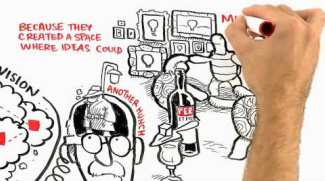 Steven Johnson explains the source of good ideas Tags: community, durkheim, knowledge, organizations/occupations/work, science/technology, theory, creativity, innovation, liquid networks, sociological perspective, steven johnson, 00 to 05 mins Year: 2010 Length: 4:07 Access: YouTube Summary: What is sociology? In broad terms, sociology is the study of society. However, this answer is often unclear or unsatisfying to an incoming class of Sociology 101 students. This clip illustrates Steven Johnson's theory of where good ideas come from, and can help explicate to students what makes the sociological perspective so unique. Instructors can begin by saying that, while most anything can be studied from a sociological perspective, some sociologists have strategically selected sites of inquiry that, at first glance, appear thoroughly individualistic in nature. This strategy is an effort to illuminate how social forces shape even the most seemingly personal of phenomena. Here, instructors can point to Émile Durkheim's study of suicide as a particularly famous disciplinary example of this (which will likely be covered later in the semester). Using a similar strategy, instructors can use the example of creativity and "good ideas" to show how social forces have a profound impact on innovation, a phenomenon that, like suicide, is often characterized as a quintessentially individual act, largely informed by psychological forces. Although some people approach creativity from a psychological viewpoint (e.g., see here), the sociological perspective can be brought into focus for students by comparing such individualistic accounts to Johnson's concept of liquid networks and his use of historical evidence to show the importance of social connectivity and collaboration for innovation. Johnson stresses the need for interconnected social spaces, organizations, and systems for the cultivation of good ideas. Johnson presents a slightly elaborated version of this argument in his TEDTalk. For other clips on The Sociological Cinema that use illustration techniques to convey theoretical arguments, click here and here. I would like to thank Open Culture and Brain Pickings for suggesting these clips. Submitted By: Valerie Chepp
2 Comments
Manuel Franco
7/30/2023 04:02:04 pm
I just want to say Thank You to everyone who supported me through the years. My name is Manuel Franco, New Berlin, Wisconsin. My story of how I won the Powerball lottery of $768.4M is a bit of a tale. I have been playing Powerball tickets for 6 years now since I turned 18. I bought my first ticket on my 18 birthday. I was feeling very lucky that day because I had contacted Dr. Odunga Michael to help me with the winning Powerball numbers. I really had that great great feeling that I looked at the camera wanting to wink at it. I only did a tiny part of it and trusted him. He gave me the numbers after I played a couple other tickets along with it for $10. I checked my ticket after the winnings came online and saw the numbers were correct including the Power play. I screamed for about 10 minutes because it felt like a dream. I had won $768.4M. You can check my winning testimony with the lottery officials just with my name search. Thank you Dr Odunga. Well, his email is [email protected] and you can also call or Whats-app him at +2348167159012 so you guys can contact him
Reply
mark hold
7/8/2024 10:02:42 am
Herbal Penis Enlargement product is 100% guaranteed to Enlarge and get a better ERECTION, the reason why most people are finding it difficult to enlarge Penis is that they believe in medical reports, drugs and medical treatment which is not helpful for Penis Enlargement. Natural roots/herbs are the best remedies which can easily Enlarge your Penis permanently Contact Dr MOSES BUBA via Email: [email protected] or via WhatsApp: +2349060529305. for Natural root and herbal remedies put together to help Enlarge manhood and Erect healthily. I also learn that Dr MOSES BUBA also can cure other types of diseases, HEPATITIS B,DIABETICS,CANCER,HPV,LOW SPERM CAM, HIV/STDS, FIBROSIS LOST OF WEIGHT, BREAST ENLARGEMENT, HIPS and BUMS ENLARGEMENT etc .
Reply
Leave a Reply. |
Tags
All
.
Got any videos?
Are you finding useful videos for your classes? Do you have good videos you use in your own classes? Please consider submitting your videos here and helping us build our database!
|
 RSS Feed
RSS Feed
